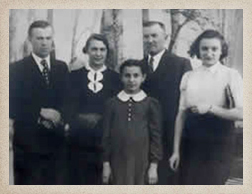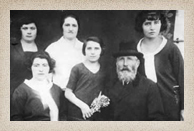
Prinz Family History: Leopolis > Lwów > L'vov > Lemberg > L'viv
"Where's your family from?" In the case of Natan Prinz and many Jews from the area where he was born, the response can get a little convoluted.
The short answer is Galicia, a historic province in Eastern Europe whose various other names betray the reason why: in Polish it's Galicja, in German Galizien, in Ukrainian [Halychchyna], in Slovak Halic, in Romanian Galitia, in Hungarian Gácsország .... Its capital, L'viv, has undergone similar name changes over the years as the title of this post indicates.
The geographic diversity of Galicia was reflected in its population. According to Paul Magocsi's A History of Ukraine, around the time Grandpa was born, the national composition of Galicia broke down as follows: 45% Poles, 43% Ukrainians, 11% Jews and 1% Germans.
Galicia, however, is not a "country". According to the passenger manifest of the Celtic, the ship on which Grandpa sailed to New York in 1921 (more on that below), he was born in the village of Nowe Selo ("New Village") in ... Poland. Poland?
In 1906, the year Grandpa was born, Galicia was part of an Austria-Hungary well into its twilight years. At that time, Poland was still stripped of its sovereignty, wiped from the map in the Third Partition of 1795, its territory divided among Russia, Prussia and Austria. The village of Nowe Selo, as well as the village of Zhuravno, where Grandpa lived at the time he emigrated, were located in the Stryj region of eastern Galicia. Click here for pictures of some historic structures in present-day Zhuravno. More...
Information provided by Jamie Prince, Natan Prinz's grandson; permission granted 4/25/10.
Moshe Prinz Oral History
My family included my father, mother, two sisters and my grandmother.
My parents married during WW I, in 1916. I was born in 1919. When they got married, Zurawno was at that time part of Austria Hungary, before Poland was established. It was Galicia. We lived in a small town, which was halfway between Lvov and Stanislavov.
My father was a soldier in the Austrian army. (I am deliberately emphasizing this because I will make a connection to this fact later on.) My father was a merchant. He had a clothing store for ready-made clothing, which was well-established, and so we enjoyed a rather high standard of living, for a small town in those days in that area.
I finished elementary school in Zurawno. Because there was no gymnasium (high school) in Zurawno, I attended a Jewish gymnasium in Lvov. The studies were on a very high level. Because it was a Jewish school, the Polish government demanded high standards and the school had a very good name [reputation]. It was also Zionist. All the teachers were Jewish. The language of instruction was Polish. We studied Hebrew and religion, more than in other schools. This greater emphasis was because the intention was for us to eventually go to Eretz Israel. More...

